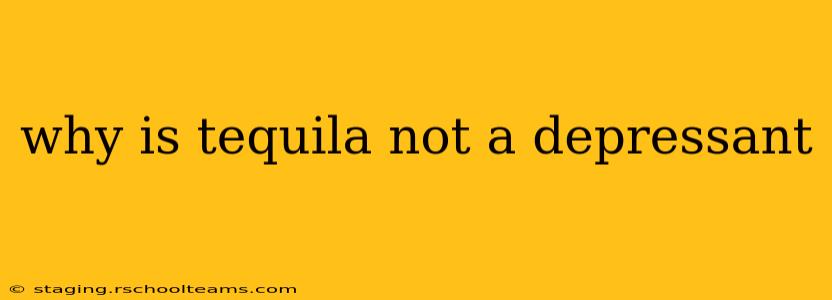Tequila, like all alcoholic beverages, is a depressant. The common misconception that it isn't stems from a misunderstanding of how alcohol affects the body and the complexities of individual reactions. Let's delve into why tequila, despite sometimes seeming to have a stimulating initial effect, is ultimately classified as a central nervous system depressant.
How Does Alcohol, Including Tequila, Act as a Depressant?
Alcohol, regardless of its source (whether it's tequila, wine, beer, or spirits), primarily affects the central nervous system (CNS). It does this by interacting with the brain's neurotransmitters, particularly GABA (gamma-aminobutyric acid). GABA is an inhibitory neurotransmitter, meaning it slows down brain activity. Alcohol enhances GABA's effects, leading to:
- Relaxation: Initial feelings of relaxation and reduced anxiety are common.
- Reduced inhibitions: This can manifest as increased sociability or impulsive behavior.
- Slowed reflexes: This is why driving under the influence is so dangerous.
- Impaired judgment: Decision-making becomes clouded.
- Slurred speech: Coordination and muscle control are affected.
- Drowsiness and sleepiness: In higher doses, alcohol can induce sleep.
- Loss of coordination: Balance and motor skills are significantly impacted.
These effects are all characteristic of a depressant. The initial feeling of stimulation or energy is often a result of the inhibition of anxieties and inhibitions, not a direct stimulant effect of the alcohol itself.
Why the Misconception? The Paradox of Alcohol's Effects
The initial "stimulating" effects often associated with alcohol, especially at lower doses, are actually a consequence of the depression of inhibitory functions in the brain. It's like releasing a brake – the brain's natural inhibitions are suppressed, leading to more uninhibited behavior. However, this is only a temporary effect; as the alcohol concentration increases in the bloodstream, the depressive effects become increasingly pronounced.
What About the "Type" of Alcohol? Does Tequila Differ?
The type of alcoholic beverage, be it tequila, whiskey, vodka, or wine, doesn't fundamentally alter the depressant nature of alcohol. The differences lie primarily in:
- Alcohol content: The concentration of alcohol significantly impacts the speed and intensity of the effects. Higher alcohol content beverages will produce a more pronounced effect faster.
- Other compounds: Different alcoholic beverages contain varying amounts of congeners (other chemical compounds produced during fermentation). These congeners can contribute to different taste profiles and potential hangovers, but they don't change the core depressant action of the ethanol itself. Tequila, for example, often contains more congeners than vodka, potentially leading to more severe hangovers for some individuals.
How to Minimize the Negative Effects of Tequila (and other Alcohol)
Responsible alcohol consumption is crucial. This includes:
- Moderation: Limiting the amount of alcohol consumed.
- Hydration: Drinking plenty of water throughout alcohol consumption.
- Pacing: Spreading consumption over a longer period.
- Awareness: Being mindful of your limits and avoiding risky behavior.
It is crucial to understand that alcohol is a serious substance and should be treated with care and respect. Excessive alcohol consumption can lead to severe health problems, including alcohol dependence.
Conclusion: Tequila is a Depressant, Plain and Simple
While the initial effects of tequila might feel uplifting due to the release of inhibitions, the underlying mechanism of action firmly classifies it as a central nervous system depressant. Understanding this is crucial for safe and responsible consumption.
